
MCLEAN, VA--(Marketwired - Mar 26, 2015) - Freddie Mac (OTCQB: FMCC) today released the results of its Primary Mortgage Market Survey® (PMMS®), showing average fixed mortgage rates moving down again across the board. Average fixed rates that continue to run below four percent will help keep affordability high for those in the market to buy a home as we head into the spring homebuying season.
News Facts
- 30-year fixed-rate mortgage (FRM) averaged 3.69 percent with an average 0.6 point for the week ending March 26, 2015, down from last week when it averaged 3.78 percent. A year ago at this time, the 30-year FRM averaged 4.40 percent.
- 15-year FRM this week averaged 2.97 percent with an average 0.6 point, down from last week when it averaged 3.06 percent. A year ago at this time, the 15-year FRM averaged 3.42 percent.
- 5-year Treasury-indexed hybrid adjustable-rate mortgage (ARM) averaged 2.92 percent this week with an average 0.4 point, down from last week when it averaged 2.97 percent. A year ago, the 5-year ARM averaged 3.10 percent.
- 1-year Treasury-indexed ARM averaged 2.46 percent this week with an average 0.4 point, unchanged from last week. At this time last year, the 1-year ARM averaged 2.44 percent.
Average commitment rates should be reported along with average fees and points to reflect the total upfront cost of obtaining the mortgage. Visit the following links for the Regional and National Mortgage Rate Details and Definitions. Borrowers may still pay closing costs which are not included in the survey.
Quotes
Attributed to Len Kiefer, deputy chief economist, Freddie Mac.
"The average 30-year fixed mortgage rate fell to 3.69 percent this week following a decline in 10-year Treasury yields. Low mortgage rates are a welcome sign for those in the market to buy a home this spring season and will help to support homebuyer affordability. Existing home sales in February increased slightly, but less than expected, to a seasonally adjusted annual rate of 4.88 million units. Meanwhile, new home sales pdfoutperformed expectations and surged 7.8 percent to an annual pace of 539,000 units."
Freddie Mac was established by Congress in 1970 to provide liquidity, stability and affordability to the nation's residential mortgage markets. Freddie Mac supports communities across the nation by providing mortgage capital to lenders. Today Freddie Mac is making home possible for one in four home borrowers and is one of the largest sources of financing for multifamily housing. Additional information is available at FreddieMac.com, Twitter @FreddieMac and Freddie Mac's blog FreddieMac.com/blog.
The financial and other information contained in the documents that may be accessed on this page speaks only as of the date of those documents. The information could be out of date and no longer accurate. Freddie Mac does not undertake an obligation, and disclaims any duty, to update any of the information in those documents. Freddie Mac's future performance, including financial performance, is subject to various risks and uncertainties that could cause actual results to differ materially from expectations. The factors that could affect the company's future results are discussed more fully in our reports filed with the SEC.
